Bridging the Gap: Listening to People You Don’t Want to Hear
Sunday, February 1st, 2015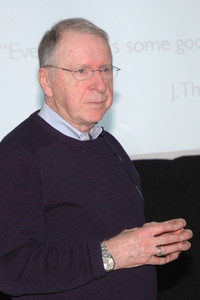 This session was focused on learning how to identify and overcome the gaps between different points of view in public and private discourse. It was facilitated by Dr. Grant Tate, CEO/Managing Partner of the bridge ltd, a Charlottesville consulting company that helps leaders make difficult decisions. He is the founder of three small companies and was co-founder of the New Mexico Technical Innovation Center and the Connecticut Venture Center, organizations formed to help formulate and grow entrepreneurial companies. Before starting the bridge ltd, Grant was an executive at IBM where he led a software development lab, introduced new products and managed reorganization of a hi-tech division.
This session was focused on learning how to identify and overcome the gaps between different points of view in public and private discourse. It was facilitated by Dr. Grant Tate, CEO/Managing Partner of the bridge ltd, a Charlottesville consulting company that helps leaders make difficult decisions. He is the founder of three small companies and was co-founder of the New Mexico Technical Innovation Center and the Connecticut Venture Center, organizations formed to help formulate and grow entrepreneurial companies. Before starting the bridge ltd, Grant was an executive at IBM where he led a software development lab, introduced new products and managed reorganization of a hi-tech division.
Dr. Tate spoke at the Wednesday, January 14, 2015 meeting of the Senior Statesmen of Virginia. The program was moderated by SSV Board Member Terry Cooper. A podcast of the session follows.
[display_podcast]
Program Summary
Grant Tate was introduced by SSV board member Terry Cooper who likened Mr. Tate’s organizational interventions to one who tunes up an automobile. But sometimes more than just a tune-up is required. Mr. Tate began by observing that if the car hardly runs, then he gets involved in “turnaround,” which is what we have to do with the people and the organization to really turn this into an organization.
One of the things that has struck him over the years on conflict resolution is how sparsely held are the skills of debate—people get mad and they’ll run away. Don’t turn your back. What can we do as individuals to help bridge the gap. Take the risk to trust the other people, and ask everyone in the group to take that risk and then you can begin to build trust in the organization. We all have our individual filters that will affect how we hear and see things and how we respond.
First there is a stimulus—something we hear or see. Next is our own interpretation. Then an emotional response followed by a behavioral choice leading to actions and finally consequences. Slow down and test your assumptions. One filter is attitude—habits of thought. Prejudice is an example of a fast response. One way to change the attitude is to change the messages. Persons are imbued with the attitude that they “can’t do it” due to the messages they hear throughout their lives. Education, training and how you communicate across different groups has a profound effect. One of the things he does in working to build organizations is to try to look at the person’s background.


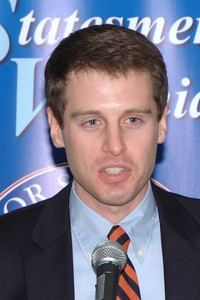 November is quickly approaching and control of Congress is up for grabs. What will be the state of play in the U.S. Senate and House as well as gubernatorial races? The real drama in this cycle will be the battle for control of the Senate, where Republicans need to win a net gain of six seats to win a majority in Congress’ upper chamber. Mr. Geoffrey Skelley spoke at the Wednesday, October 8, 2014 SSV meeting, which was moderated by SSV President Robert McGrath. A podcast of his remarks can be found here.
November is quickly approaching and control of Congress is up for grabs. What will be the state of play in the U.S. Senate and House as well as gubernatorial races? The real drama in this cycle will be the battle for control of the Senate, where Republicans need to win a net gain of six seats to win a majority in Congress’ upper chamber. Mr. Geoffrey Skelley spoke at the Wednesday, October 8, 2014 SSV meeting, which was moderated by SSV President Robert McGrath. A podcast of his remarks can be found here. Dahlia Lithwick recaps the highlights of the last Supreme Court term and gives a brief preview of the term to come. The program was moderated by SSV board member Grace Zisk. Interesting questions and answers follow her talk. Listen to her lively presentation on the podcast.
Dahlia Lithwick recaps the highlights of the last Supreme Court term and gives a brief preview of the term to come. The program was moderated by SSV board member Grace Zisk. Interesting questions and answers follow her talk. Listen to her lively presentation on the podcast.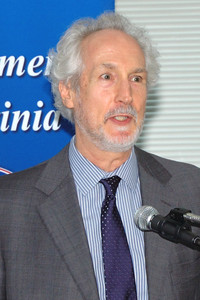
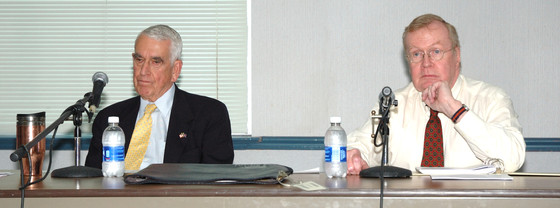
 Terry Cooper does political research, principally opposition research for Republican candidates. He is a graduate of Episcopal High School, Princeton University and the University of Virginia School of Law, where he was research editor of the Virginia Law Review, a member of the National Moot Court Team and elected to the Order of the Coif, the law-school equivalent of Phi Beta Kappa. He practiced law with the Wall Street firm Sullivan & Cromwell and held executive positions with three Fortune 500 companies before founding his firm, Terry Cooper Political Research, in 1982. Terry has taught opposition research at the Republican National Committee’s Campaign Management Colleges, at American University’s Campaign Management Institute, at George Washington University’s Graduate School of Political Management, at the University of Florida and at training programs sponsored by the state Republican parties of Virginia, Delaware, Illinois, Michigan, Tennessee, Wisconsin and Washington State.
Terry Cooper does political research, principally opposition research for Republican candidates. He is a graduate of Episcopal High School, Princeton University and the University of Virginia School of Law, where he was research editor of the Virginia Law Review, a member of the National Moot Court Team and elected to the Order of the Coif, the law-school equivalent of Phi Beta Kappa. He practiced law with the Wall Street firm Sullivan & Cromwell and held executive positions with three Fortune 500 companies before founding his firm, Terry Cooper Political Research, in 1982. Terry has taught opposition research at the Republican National Committee’s Campaign Management Colleges, at American University’s Campaign Management Institute, at George Washington University’s Graduate School of Political Management, at the University of Florida and at training programs sponsored by the state Republican parties of Virginia, Delaware, Illinois, Michigan, Tennessee, Wisconsin and Washington State. Leigh Middleditch is a vice president with
Leigh Middleditch is a vice president with  Senator Creigh Deeds (D) represents the 25th Senate District, which includes the counties of Alleghany, Albemarle (part), Bath, Highland, Nelson, and Rockbridge, and the cities of Buena Vista, Charlottesville, Covington, and Lexington. He serves on five Senate standing committees: Transportation (Chair); Finance; General Laws and Technology; Privileges and Elections; and Rules. He was first elected to the House of Delegates in 1991, winning reelection five consecutive times before leaving the House to fill the seat of the late Senator Emily Couric in a special election in 2001. He was the Democratic nominee for state Attorney General in 2005, losing that race by the closest margin in Virginia history and was the Democratic nominee for Governor in 2009.
Senator Creigh Deeds (D) represents the 25th Senate District, which includes the counties of Alleghany, Albemarle (part), Bath, Highland, Nelson, and Rockbridge, and the cities of Buena Vista, Charlottesville, Covington, and Lexington. He serves on five Senate standing committees: Transportation (Chair); Finance; General Laws and Technology; Privileges and Elections; and Rules. He was first elected to the House of Delegates in 1991, winning reelection five consecutive times before leaving the House to fill the seat of the late Senator Emily Couric in a special election in 2001. He was the Democratic nominee for state Attorney General in 2005, losing that race by the closest margin in Virginia history and was the Democratic nominee for Governor in 2009. Delegate David Toscano (D) represents the 57th District in the House of Delegates (Charlottesville and part of Albemarle County) and, since 2011, has served as House Democratic Leader. He is a member of the Courts of Justice; Transportation; and Rules committees. He is also a member of the Disability Commission and has served on the special Joint Subcommittee to Study Land Use Tools in the Commonwealth and the Joint Committee to study Math, Science, and Engineering. He is a member of the Manufacturing Development Commission, the Virginia Adopts Statewide Steering Committee, the Virginia Alcohol Safety Action Program Committee, and the Board of Directors of the New College Institute. He is also a member of the United Way Board.
Delegate David Toscano (D) represents the 57th District in the House of Delegates (Charlottesville and part of Albemarle County) and, since 2011, has served as House Democratic Leader. He is a member of the Courts of Justice; Transportation; and Rules committees. He is also a member of the Disability Commission and has served on the special Joint Subcommittee to Study Land Use Tools in the Commonwealth and the Joint Committee to study Math, Science, and Engineering. He is a member of the Manufacturing Development Commission, the Virginia Adopts Statewide Steering Committee, the Virginia Alcohol Safety Action Program Committee, and the Board of Directors of the New College Institute. He is also a member of the United Way Board.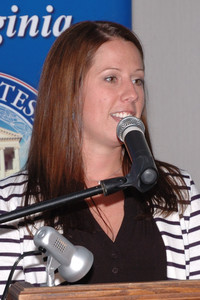 Since its inception in 2004, the
Since its inception in 2004, the 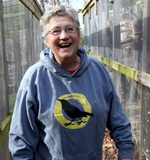 Nathou Attinger was born in France, and moved to the United States at age 3. Nonhuman animals always fascinated her, and as soon as her family moved to a house with a yard, she started taking care of them. Dogs, cats, turtles, pigeons, raccoons, anything that seems to need her help is scooped up and taken care of in her bedroom. She got her BA in French Literature at UVA, got married and had a daughter. In 1982 she started the Elementary Montessori School of Charlottesville (Mountain Montessori) for her daughter while she was working as the administration head of the Emergency Room at UVA Hospital. Her love of the outdoors won out, however, and she attended Piedmont Virginia Community College at night to learn about landscaping. She then started her own landscaping company. While landscaping, she also attained her wildlife rehabilitator’s license and began to start working with wildlife. She would take baby animals with her while she was landscaping to make sure they could be fed during the day. Finally, in 2004, the Rockfish Wildlife Sanctuary was born, and has been growing ever since.
Nathou Attinger was born in France, and moved to the United States at age 3. Nonhuman animals always fascinated her, and as soon as her family moved to a house with a yard, she started taking care of them. Dogs, cats, turtles, pigeons, raccoons, anything that seems to need her help is scooped up and taken care of in her bedroom. She got her BA in French Literature at UVA, got married and had a daughter. In 1982 she started the Elementary Montessori School of Charlottesville (Mountain Montessori) for her daughter while she was working as the administration head of the Emergency Room at UVA Hospital. Her love of the outdoors won out, however, and she attended Piedmont Virginia Community College at night to learn about landscaping. She then started her own landscaping company. While landscaping, she also attained her wildlife rehabilitator’s license and began to start working with wildlife. She would take baby animals with her while she was landscaping to make sure they could be fed during the day. Finally, in 2004, the Rockfish Wildlife Sanctuary was born, and has been growing ever since. At the March 12, 2014 meeting, Dr. Frank Friedman, president of Piedmont Virginia Community College, discussed its mission, enrollment, curriculum, student outcomes, facilities and funding. The program was moderated by SSV Past President Sue Liberman. Listen to the podcast of his comments.
At the March 12, 2014 meeting, Dr. Frank Friedman, president of Piedmont Virginia Community College, discussed its mission, enrollment, curriculum, student outcomes, facilities and funding. The program was moderated by SSV Past President Sue Liberman. Listen to the podcast of his comments. Richard W. Lindsay, M. D., Emeritus Professor of Internal Medicine and Family Practice and former head of the Section of Geriatric Medicine, University of Virginia Health Science Center, grew up in Upstate New York, where his father was a family physician. He attended Cornell University and New York Medical College from which he received his M.D. degree and where he was a member of Alpha Omega Alpha. Following an internship at Buffalo General Hospital in Buffalo, NY, Dr. Lindsay practiced briefly with his father in Old Forge, NY, and then completed a residency in Internal Medicine at the University of Virginia Hospital. Following active duty as a Major in the US Army Medical Corps, in 1969 he joined the faculty of the Department of Internal Medicine at UVA.
Richard W. Lindsay, M. D., Emeritus Professor of Internal Medicine and Family Practice and former head of the Section of Geriatric Medicine, University of Virginia Health Science Center, grew up in Upstate New York, where his father was a family physician. He attended Cornell University and New York Medical College from which he received his M.D. degree and where he was a member of Alpha Omega Alpha. Following an internship at Buffalo General Hospital in Buffalo, NY, Dr. Lindsay practiced briefly with his father in Old Forge, NY, and then completed a residency in Internal Medicine at the University of Virginia Hospital. Following active duty as a Major in the US Army Medical Corps, in 1969 he joined the faculty of the Department of Internal Medicine at UVA.